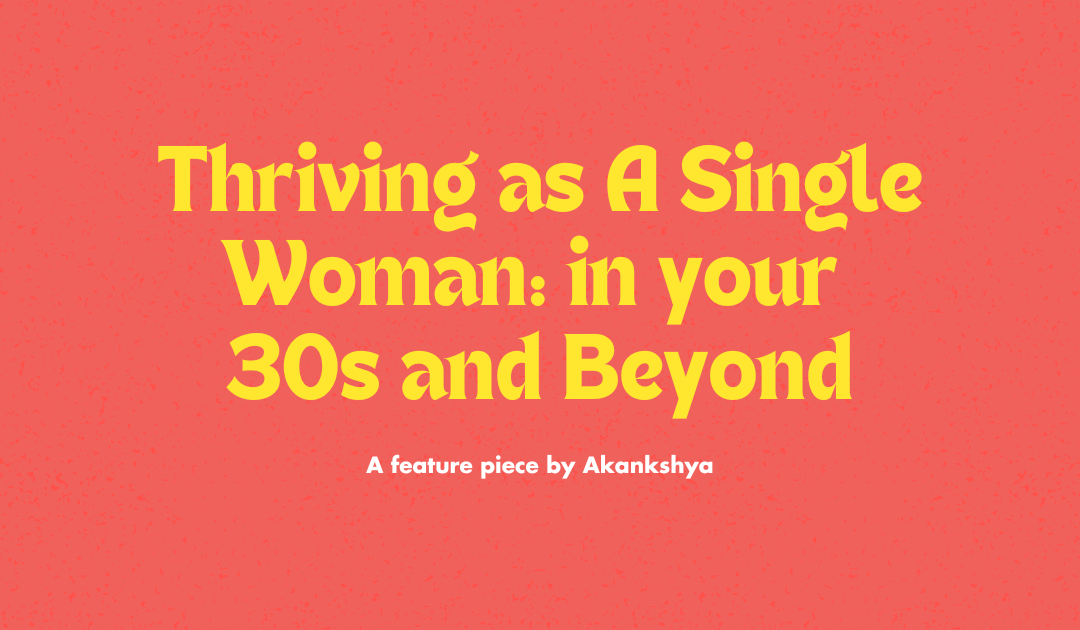This is feature piece by Akankshya. For the DD blog.
What becomes of a woman when she stops looking at romantic partnerships as the ultimate trophy or motive for being alive?
I set up a long Google form to find answers to this question. It didn’t come to me out of nowhere. I was surprised by my response to a 25yo who recently asked me how I coped with my desire to be chosen by someone who’s not related to me by blood. I stared at the texts which began with, “In five years, it no longer matters. I have a better sense of self and I don’t think about love or being loved consciously anymore.” I remember turning 25 like it happened yesterday and yet it feels so far away in the past. When did I become this person who is so secure in herself that she doesn’t think about romantic partnership and external validation consciously? There was pride in my smile as I explained my answer further.
The questions I asked in the form required people to be vulnerable. I asked about their ideas of love, experiences of being in a romantic partnership, idea of self, aftermath of the separation, support, societal pressure to follow a conventional life/timeline, bonding with people, and the role of finances through it all. I wanted to listen to people who are single in their 30s and beyond after a significant romantic partnership ended. I wanted people who have experienced intimacy, the pros and cons of having a partner, and living with them. I wanted to know how they look at their lives now. Somewhere in my head, there was a sense that we discover ourselves through the tumultuous 20s. I wanted to look at the transition.
My focus was on single women but when men reached out to me, I shared the form anyway. I wondered if gender affected how we cope with partnerships and heartbreak, especially when identity and finances are concerned. I was in for an emotionally consuming drive when I received 35 responses in 3-4 days. I was surprised that men were more descriptive than women. Perhaps a promise of anonymity allowed them the space to pour out their hearts without the fear of judgement. Women seemed mostly nonchalant. Some of them had survived abusive marriages, some had to let go of healthy relationships.
In this essay, I focus on people who have been single for 2 to 7 years. The ones who have been single for less than 2 years have “the knee-jerk reaction of ‘I’ll never love again’” as described by Nicole (F, 40). The ones beyond 7 years have become Manju Mai from Laapata Ladies, too unconcerned about partnerships, perfectly content in being alone, they aren’t even lonely. What a delightful state of being! However, the ones who have been single for 2 to 7 years share a common enthusiasm for the life they have built and also happen to cautiously, yet lightly, hold space for romantic partnerships.

Credits: Netflix India
The Initial Idea of Love and the Changes That Followed
If love were what we read in romance novels, and watched in films, what could have gone wrong? Alas! Many participants in the survey said they had ‘delusional’ ideas of love. Many women grew up waiting for a knight in shining armour. When they found someone who saved them from their demons, they called it love. They dedicated themselves to the person. In turn, succumbing to the patriarchal gender roles in a union.
Witnessing love in real life can have a drastically different impact on people. Trisha Ghosal, a sports journalist from Kolkata (F, 33) said, “As a kid, I got to know my parents had a love marriage. I asked mom and dad separately as to how they knew they were in love. Interestingly both of them said the same thing: love is that feeling when you want to be with a person, want to adjust for the person. You are okay making efforts and are open to talking about the differences between you. You stick with each other through thick and thin.”
With the experience of being in a relationship, people come face to face with the ground reality. The fact that they want to provide for their partners or devote themselves to them doesn’t take away the reality that most of them are working on assumptions based on the representation of romance in popular culture. It is difficult to have a transparent conversation about meeting the needs of a partner while addressing one’s own. Matters like finance can be challenging to talk about especially if one is not used to having conversations surrounding money. Almost everyone underwent a shift in their perspective of love, as they became more grounded in the reality of their experiences. It is interesting to note that despite their experiences, they didn’t showcase bitterness towards the larger idea of love.

Identity and Financial Independence
When I spoke to Pallabi Mishra, an embedded developer (F, 30) who moved from India to Germany in her 20s and managed her relationship across continents, she couldn’t stop expressing how happy and perfect her life seems today. She underwent a dramatic physical change after the separation. An ambitious woman all her life, she lost track of her PhD. She gained 20 kgs, her hair began greying, and wrinkles began showing up. In the years that followed, she wondered what she could have done better. One day she decided, enough. She joined a gym nearby, completed her research, got a job in a reputed company in Berlin, and later quit it to become an embedded developer for a startup in Karlsruhe, Germany. Despite having suffered for a couple of years when she didn’t know better, she could not stop emphasising the relief of not being in a relationship. “Even when you’re not fighting, you are still thinking about them, there’s always some conflict, always something that goes unresolved and stays in one’s mind.” She adds, “I now have time for myself. I go on weekend solo trips, and explore the nearby places. I’m doing much better than I ever imagined myself in my best dreams. After fulfilling my crazy wishes, I’m busy making new bucket lists now.”
Pallabi’s sentiments are shared by other women who expressed their relief upon the demise of their relationship. They took their time to deal with the heartbreak and eventually discovered things they were interested in. Financial independence played a huge role in the process. This allowed women to travel and live alone, both activities were done on their own time and allowed them to explore the recesses of their minds to show up better for themselves. With new experiences, they were able to build a world around their grief rather than getting consumed by it.
An interesting finding was that men associate shame with their inability to provide for themselves in situations such as changing jobs or preparing for government exams for stable jobs. Women are grateful for the financial support they received from friends and families and are focused on upskilling themselves to earn better. The difference between the genders, in this particular survey, is their attitude towards life at large. Men seemed to lean more towards melancholy while women strove towards creating communities and chosen families. This invites a larger discourse on patriarchy and its impact on men.
Loneliness, interdependence, and community
I set two different questions in the form:
1. What do you do when you are alone?
2. What do you do when you are lonely?
It brought me immense joy to read people have answered both questions differently. When they are alone, they read, watch OTT, scroll through social media, listen to podcasts, play music, reach out to friends over calls, work out, so on and so forth. They find something to do which may or may not include other people including, learning new skills such as sketching. When they are lonely, they allow themselves to feel their feelings and allow the moment to pass. They cry and write. Sometimes, they think about reaching out to their ex but they don’t. They return to old memories, yearning for someone to be by their side. They miss cuddles and hugs. They explore dating apps.
I was intrigued by the specificity of the answer of an IT professional (M, 31) from Pune who mentioned, “cook mutton” as a way to cope with loneliness. Food has an extraordinary ability to evoke feelings of love and what a lovely way of expressing love towards yourself, than to cook a meal?
Dealing with heartbreak and moving forward is a solitary affair irrespective of the support one receives. The participants, the ones residing in India*, of this survey were able to afford therapy which helped them change how they spoke to themselves and practice gratitude. From having break-up journals to reaching out to friends with cautious expectations, many women have come to build a life of interdependence. One such story is that of Ankita Shinde’s. Ankita (F, 33), a brand consultant and visual artist based in Mumbai says, “I go to stay with one of my many bestest girl friends for a couple of days and do cute things together like make and have chai, drink gin, and at good food, play games, dance etc, and hugs.” The idea that a few people reiterated is that this loneliness won’t kill them. A content writer (F, 30) from Chennai mentioned, “I happened to hear someone say how much ever we are happy being alone the huge gaping hole left by not having a romantic partner will be there and it is okay to have that rather than acting as though it doesn’t exist or doesn’t matter.” Nikole (F, 40), a life coach based in California, asserted, “I love love. I love romance. I love having someone to turn to. But what my divorce has taught me is that I’ll be okay no matter what. I’d prefer to be with my lover, but if it ever ends, I’ll be okay. I’ll always make it. My life is beautiful and meaningful and valid with or without another person to share it with.” Once you believe this, you turn towards creating joy in life!

When I set up this form, my thoughts were limited to my experiences. The responses brought in catharsis, even more so when people left the feedback that filling the form helped them reflect on their lives and feel good about how far they have come. People opened up, and let me into their lives. What inspired me the most was the acceptance showcased by most of the respondents – acceptance of their past and gratitude for their present along with a tender determination to make the best of their circumstances, irrespective of romantic partnerships. All they want to do is create a fulfilling life and live peacefully. This completely takes away any taboo associated with single women because these women have followed the social conditioning towards marriage and relationships and made their way into a life they believe to be ‘giving’ without shaming men at large. They are thriving, not by any social standard but by the ones they have created for themselves. I am grateful to the men who filled out the form, described their walks across a beautiful city such as London and that one colleague who they play FIFA with can be their friend and confidante, implying that one doesn’t need a loud social life, a few cherished connections are enough. As far as I am concerned, I am entering my 30s with curiosity. I don’t know what a relationship looks like when I am not trying to prove that I am good enough, when I don’t feel the need to compete with anyone. So, my curiosity knows no bounds, it would be interesting to see what and whom I might choose. All I know is that I will always find people I align with, as I have so far in life and that I will be okay no matter where life may take me.
*I’d like to emphasise that this article is based on a limited number of responses from urban spaces such as Delhi, Mumbai, Bangalore, Chennai, Kolkata. I received a few responses from Germany, California, UK, Netherlands, and Lithuania.

